Brandi "Biz" Grove
Singer/songwriter, wife, mother of 2 girls (Camille and Caris), sister, and friend. She believes music is the soul’s language and that loving-kindness paired with courage can heal the world.
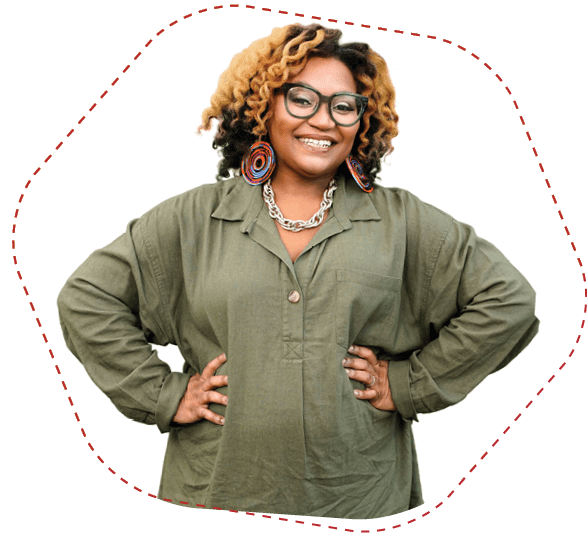
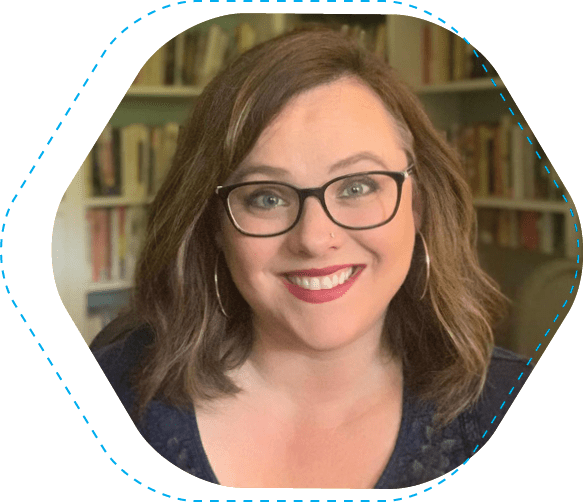
Sarah Bessey
Sarah Bessey is the editor of New York Times bestselling book, “A Rhythm of Prayer.” She co-leads Evolving Faith and serves as president of the board for Heartline Ministries in Haiti.
Ani Zonneveld
Ani Zonneveld is a writer, singer/songwriter, founder and President of Muslims for Progressive Values (MPV), a human rights organization that advocates for social justice and equality for all, a strong supporter of freedom of expression and of conscience, women’s rights and as an ally, LGBTQ rights. Ani promotes these values at the United Nations by challenging human rights abuses in the name of Islam, and by offering an inclusive understanding based on universal human rights.
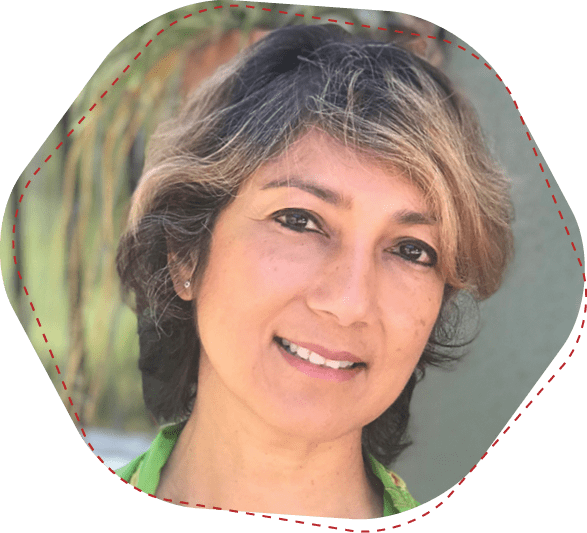
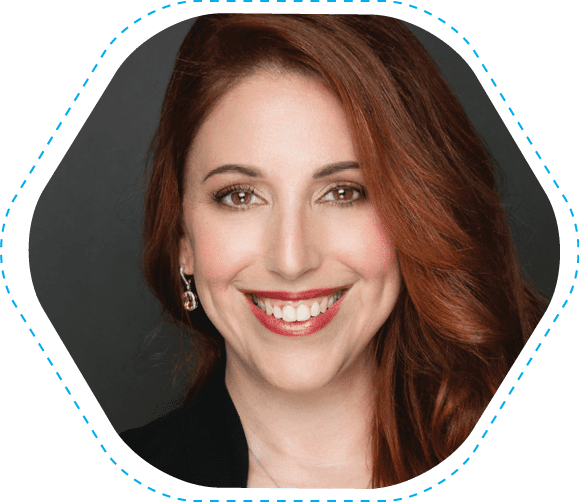
Diana S. Gerson
Rabbi Diana S. Gerson is Associate Executive Vice President of the New York Board of Rabbis (NYBR), where she has served since 2005. A major focus of her work has been to advance the NYBR’s leadership role in confronting family violence, domestic violence, sexual abuse, and the exploitation of children by reaching across faith communities.
“We recall the valiant women leaders who lifted their voices over the generation.
We stand on their shoulders, and they bless our work. They are the children who are mistreated and violated. They are the adults who are sidelined and isolated. They are the elders who spoke out when others tried to force them into silence. They are the young people who challenged the status quo. They are our brothers who reexamined the structures that exist and believed they could be transformed. They are our sisters who are working to change the world, revisioning scriptures, sacred spaces, and faithful communities.
Gathering in this sacred virtual space, we are the dreamers, the vision-keepers, the builders, the leaders of a bolder, more inclusive, and authentic tomorrow, striving in love for the future of all humanity. May we listen to each other and honor each other’s words, hearts, and deeds. May we work tirelessly to support this interfaith sisterhood. Those who have been leading for decades and those who are just beginning as we endeavor to transform our faith institutions and communities while honoring both our individual and our collective faith. Let us be fearless, bold, creative, tenacious, resilient, confident, united, and determined. May we embrace our dignity, goodness, and love, created in your divine image. We are charged by our sacred texts to aid one another as we journey through these narrow places. May the visions and works of our tribes of justice build a brighter future filled with the promise of love, mercy, and the blessing of peace. May it be God’s will.”
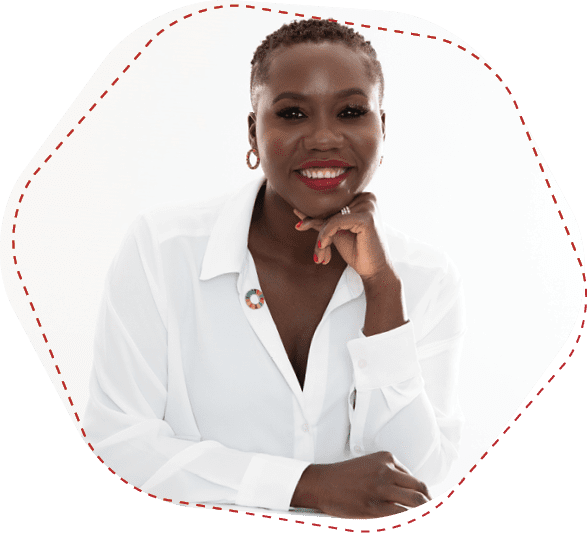
Blessing Omakwu
Deputy Director, Bill & Melinda Gates Foundation
“For the longest time, I kept my faith and home in separate boxes, but years ago, I attended a summit that was pivotal as I met women who were using their faith to inform their work. From that moment on, my faith became a part of my public work. Convenings can be powerful; women coming together can be powerful.
When women of faith come together, there is a collective power that cannot be quantified. It is a power that can disrupt the most difficult, complicated, and insidious aspects of patriarchy in our world today. We hope this gathering will leave you feeling inspired, connected, and equipped.”
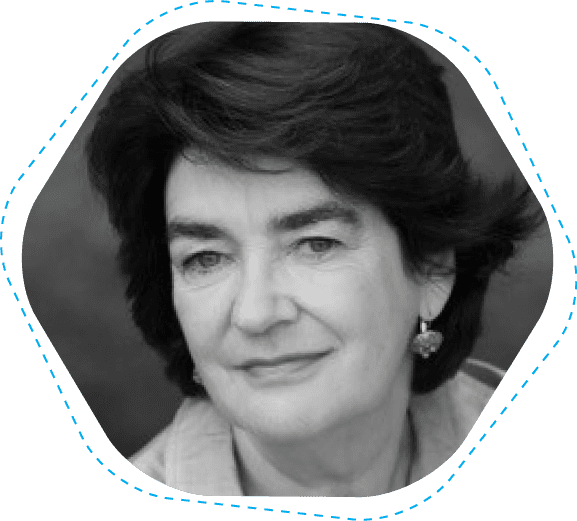
“This is a unique, intergenerational, and global gathering. This work is hard. Women leading change are often isolated, unsafe, and under-resourced. We all stand on the shoulders of women and men who have been doing this hard work for decades.
We want to elevate the powerful impact of women’s leadership, which is often invisible. We want to connect each other for mutual support, with a special emphasis on young leaders and older champions. We want to exchange stories of change. Finally, we hope to equip participants with new skills with a focus on safety in the digital space.
May you take away new ideas, new allies, and renewed hope. The spirit of ‘ubuntu’ brings the whole sisterhood and the whole community with you. Love is the way. When women join together, united across generations, faiths and geographies while working with male allies, lasting change happens.”
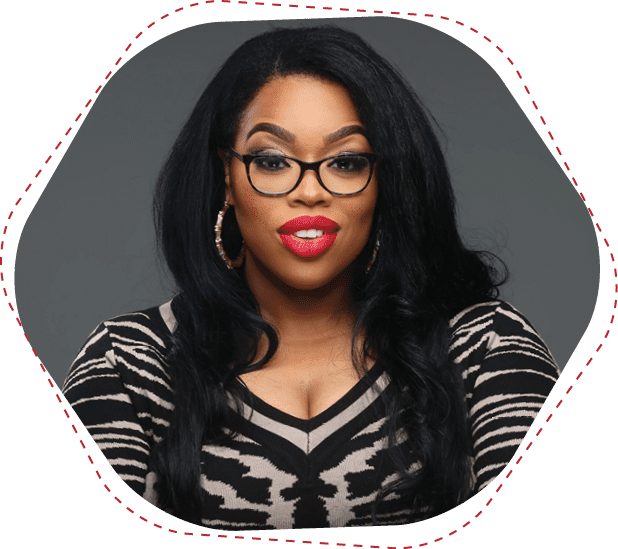
Candice Marie Benbow
Author, “Red Lip Theology: For Church Girls Who’ve Considered Tithing to the Beauty Supply Store When Sunday Morning Isn’t Enough”
“The power of agency as we do this work is so important. This is one of the reasons we push for and wanted to host this convening. We come from so many backgrounds and too often we can be siloed and think that those who come from development work can only work with people who do development work and those who are engaged with peace and reconciliation work can only work with those who do peace and reconciliation work.
However, for all of us, our faith informs our work whether we believe the same things or are in different faith traditions, faith informs all we do. We are doing this to empower and give people hope. Faith is about empowering people and that is what we are here to do.”
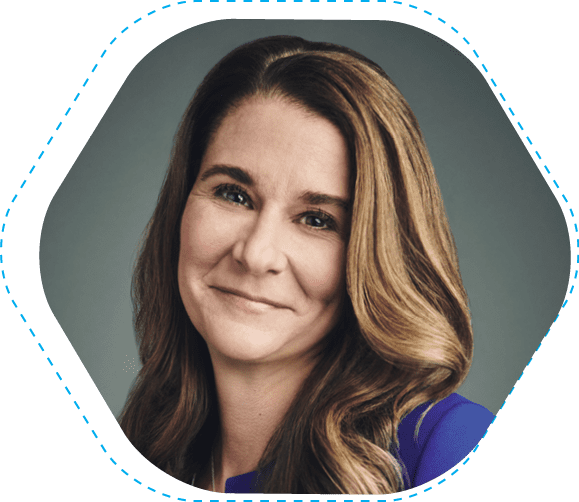
“Like so many of you I became the person I am today because of my faith. My parents taught me and my siblings to see the holiness in every human being. At Catholic school the motto was Servium, I will serve. Those two big ideas led me on my path to global development and gender equality. When you lift up women, you lift up humanity.
We need more religious leaders who challenge the norms that are holding billions of women, girls, and women back. We see that faith is, at its essence, about love. The best way to love people is to help them lead the lives they dream of. There is nothing more inspiring than women raising their voices. When women lead change, everybody is better off.”
Sisterhood is the symbiotic connection between us despite our differences.
Microaggressions: Those things that are 'subtle' but prevent women from achieving full access.
Even in institutions committed to gender equality, there are often subtle policies that reinscribe inequality.
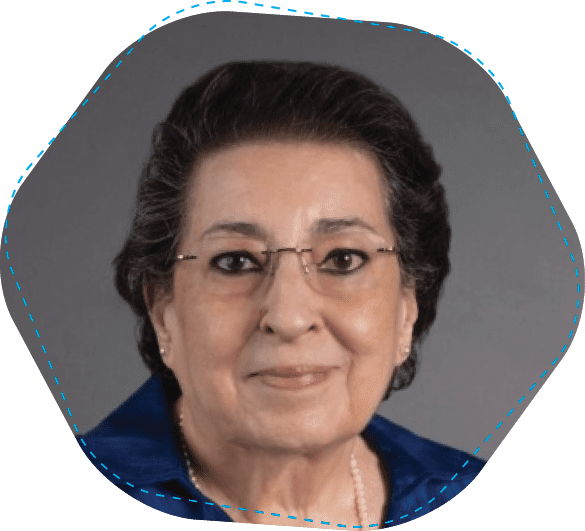
Dr. Thoraya Obaid
Former Undersecretary General, United Nations
Former Executive Director, United Nations
Population Fund
“Change can never be imposed from outside; it must be fulfilled, brought about by people from inside, looking at their own faith, cultural practices, and beliefs. Then they can contest what is negative and decide to change it. Only then can they empower themselves with the positive beliefs that support women, children, families, and a healthy life for everyone where everyone can exercise their rights.
Change comes from within, so as leaders you must be patient, resilient and most of all, approach through infiltration, rather than confrontation. Confrontation brings anger and negative emotions. Infiltration finds ways to talk to communities, understanding their limitations, arguments and then working with that. That is how you support women and healthy societies.”
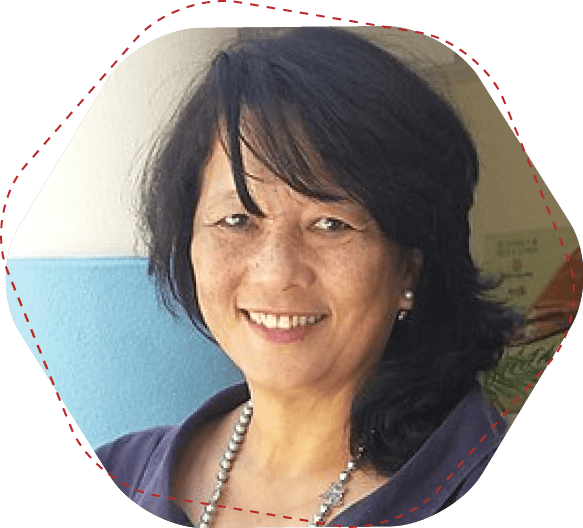
Zainah Anwar is a founding member and former executive director of Sisters in Islam, a Malaysian non-governmental organization working on women’s rights within the Islamic framework. The group works in the areas of research, advocacy, public education and legal reform and services to push for a progressive rights-based understanding of Islam.
It engages with a wide range of issues, including Islamic Family Law, Islamic Criminal Law, domestic violence, freedom of religion, freedom of expression, Islam as a source of law and public policy, and Islam and women’s rights. Zainah is currently the director for Musawah, a global movement for equality and justice in the Muslim family. She also writes a monthly column on politics, religion, and women’s rights, called Sharing the Nation, in the Sunday Star, Malaysia. She is a former member of the Human Rights Commission of Malaysia.
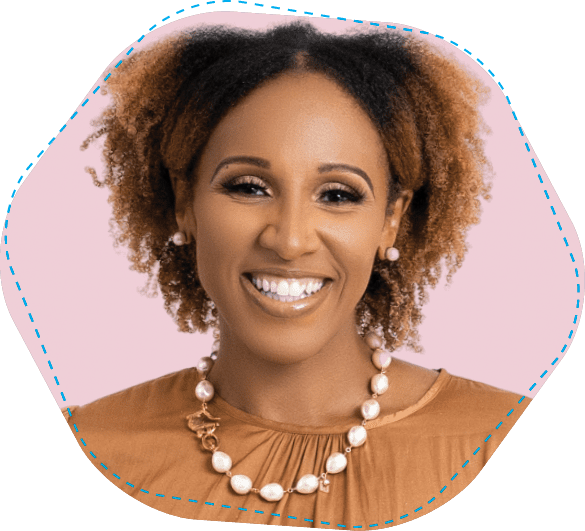
Nona Jones
Director, North America Community Partnerships
Global Faith Partnerships at Meta, the company formerly known as Facebook
Since being licensed into the gospel ministry at the age of 17, Nona has preached around the world. As a business executive and entrepreneur, she has been profiled by ESSENCE Magazine as an “Under 40 Woman to Watch” and Florida Trend Magazine as one of Florida’s “30-Something All Stars.” She holds a bachelor’s in communications and Master of Business Administration from the University of Florida where she has been recognized as an Outstanding Young Alumnus and she has completed graduate studies at the Harvard Law School Program on Negotiation.
She is the Founder of Faith & Prejudice, a social justice organization that is convening, equipping, and mobilizing local churches across North America to build bridges to racial equity. She is a graduate of Leadership Florida and the Presidential Leadership Scholars Program, a joint initiative of President George W. Bush and President Bill Clinton. Her civic engagement includes The Links, Incorporated, Alpha Kappa Alpha Sorority, Inc., the University of Florida Digital Advisory Council, and the Salvation Army Western Territorial Advisory Board.
How do we use our scriptural traditions to prevent the abuse of women and girls?
Is it possible to use the same tools to advance women that also are used to justify that abuse?
Dismantling and deconstruction work is holy work.
Amanda Mukwashi
Former CEO Christian Aid
Current UN Resident Coordinator, Lesotho
Speaking in a personal capacity
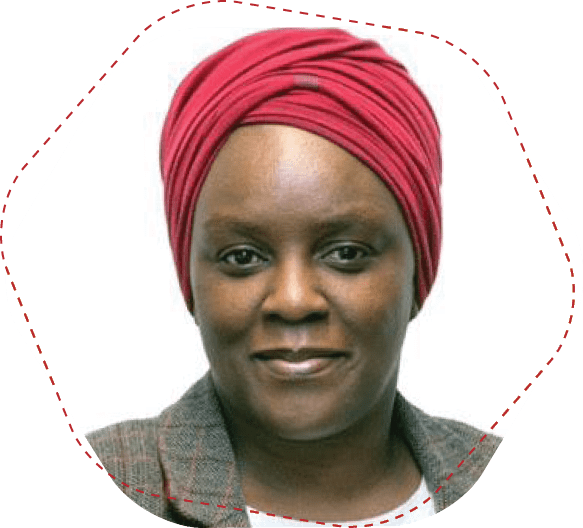
“Gender-based violence is a manifestation of patriarchy and religion, not faith. Faith is a personal belief in God, but religion includes doctrines and interpretations of scripture. It is very difficult as a human being to take in the level of abuse that comes toward women and girls, but if we stop there, we don’t get to the root causes of abuse. If we trace the way women are treated the world over, look at how it has been a struggle to get to the point where we are respected and treated with dignity, we have to look at the interface of religion and patriarchy.
If you are privileged to be in leadership, then you are duty-bound to dismantle anything that does harm. This includes legislation that oppresses women or puts people at risk. This is not easy. Raising your voice means you might be targeted or bullied, but for people of faith, we cannot afford to be silent. We must tackle, one policy, legislation, and theology at a time. If they don’t stand up to scrutiny, we must dismantle them, one word, one sentence, one book at a time. Let’s not give up on ourselves and those who need us to speak up for them. Let’s not give up on Christ because he went to the cross for us and he has not given up on us.”
Our lives are embedded in our faith.
We can’t avoid faith, the majority of the world sees it as something central to their identity as people.
At the start of every academic year, I have to remind myself that I am starting from ground zero, facing a group of students who have likely never encountered a woman in pastoral or academic leadership. It’s humbling.
Dr. Nontando Hadebe
International Coordinator, Side by Side Gender Justice, hosted by We Will Speak Out South Africa, Member, Circle of Concerned African Women Theologians
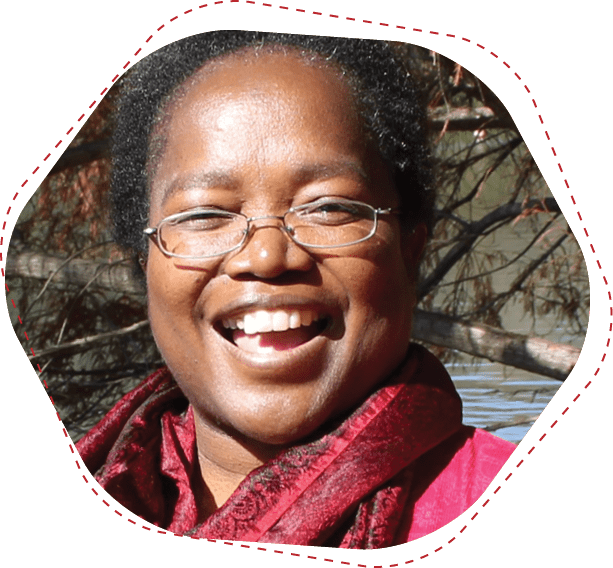
“On the surface, it looks like we are making progress with women getting ordained and occupying leadership positions, but if we dig even a centimeter deep, we will see that the patriarchy is still intact. There are some places where women are still not allowed to be. We see that even in the subtle practice of religion with the masculinity of how God is referred to and the exclusion of phenomenal women in the Bible. We can’t say that when a little girl walks into a church, she will feel that she belongs.
Women created in the image of God have every right to participate in the Church and in society. When women are included, it isn’t a token; it is a realization that the religion has transformed so all people find dignity. We have to make sure a metamorphosis happens. We want to birth something completely different, so religion expresses its own ideals.”
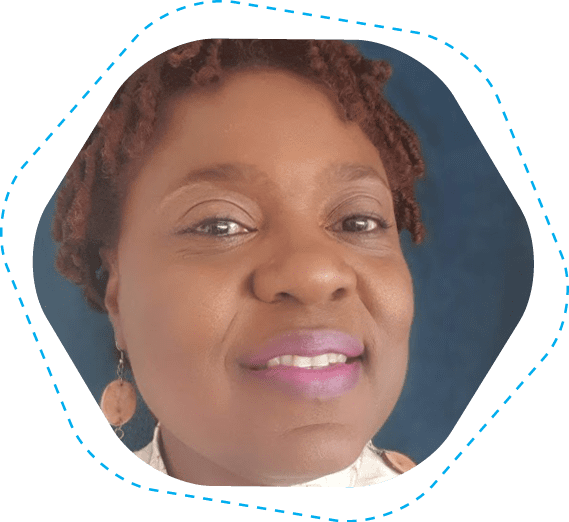
Reverend Nicqi Ashwood
World Council of Churches Program Executive for the Just Community of Women and Men
“I wanted to be a missionary when I grew up. But every missionary I read about didn’t look like me. They were white and male. That presented a problem. I tried every route. It soon became clear that the church on the side thing is not going to work. I learned that many are willing to crack the door, but don’t want to let us in. But we are like sand, and we are going to find a way and bring all of our people with us. The challenge is that we need men to understand that we are here to play, work and pray and here to stay.
I am often inundated with stories of women wiped out of the picture through rape of children, women, and wives. There is no way to be a woman of faith and not be political. Being human comes with a responsibility so there is no option but to work together, stand on the shoulders of women and other saints male and female who have stood on the shoulders of others. It is religious, feminine, and human.”
The global/inter-religious relationships we cultivate as women are so critical for the future of our work!
How do we not block the energies of each other?
This work comes with tremendous cost & sacrifice.
Prof. Dr. Azza Karam
Secretary General of Religions for Peace,
the largest multi-religious leadership platform
with 92 national and 6 regional Interreligious Councils
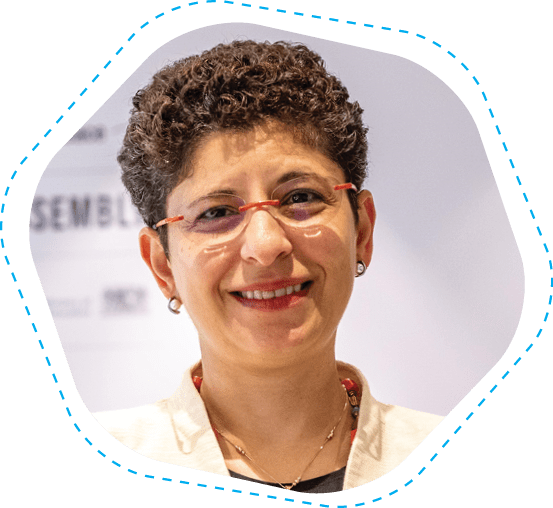
“Doing public work at the intersection of faith and gender equality can be isolating, difficult and even dangerous. You can’t grow up in the non-western world and not be confronted with faith as an everyday aspect of language. This secular notion that religion is over here and everything else is over there never really applied to the rest of the world. We grow up with faith and religious language. The intersection of faith with everything-politics, business, family culture, marriage, divorce, even children-can’t be avoided. Those of us who want our faith to be our primary anchor, have to navigate life through that lens. That is why we have to work in alliances and partnerships to stay true to what we believe in.”
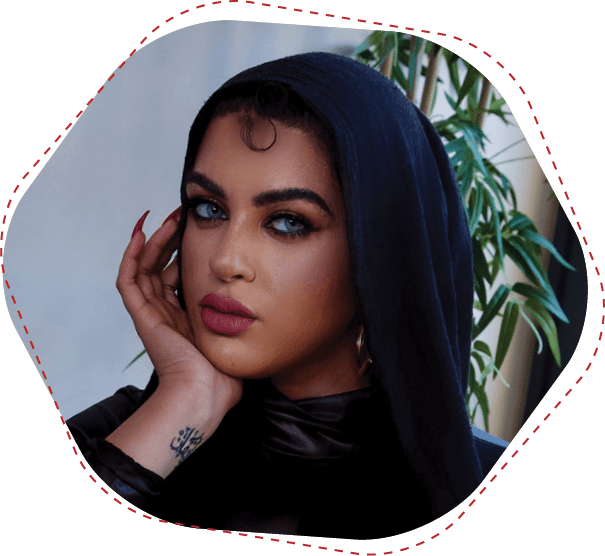
Amani Al-Khatahtbeh
Author, Activist, Founder, Muslimgirl.com
“Social media is a mass form of communication and a way we are making conversations far more accessible than they ever were before. I started MuslimGirl.com out of my bedroom as a teenage girl with no resources. Social media amplified taboo conversations to mainstream levels. Today, it is far easier to build an online presence and connect with other people. It can melt borders and the potential is limitless. It offers the cloak of anonymity that is really important for some people who are putting their lives and livelihoods on the line. It is a necessary strategy and tool. For marginalized communities, it is one of our biggest assets.
It is also a double-edged sword. It can be used as a weapon for those who want to harm us. The violence that we experience in real life can replicate in this space, too. As women of color leading the way, we are unfortunately going to get violent threats. We have chosen to push back by amplifying the counter speech, making our conversation so strong that we overcome it.”
Loving for the sake of living is remarkably empowering.
Where do we go next is always the question.
How do we sustain change!?
The determination to love equals resilience.
It’s also about building capacity of women to take over if you want to relinquish your position so that the organisation does not collapse.
Resistance is the sign you’re doing something right.
Emily Joy Allison
Campaign Communications Manager,
Emily’s List at Vanderbilt Divinity School
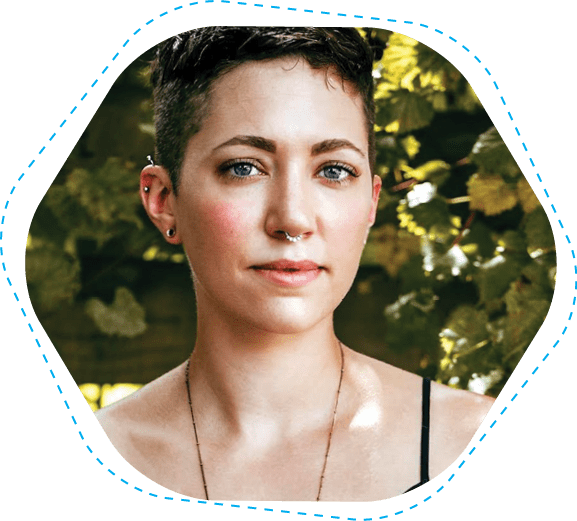
“There are risks and opportunities in social media. It can replicate a lot of the social inequities that are out there in the world. But there is also an opportunity to do something different and turn them on their head for people whose voices don’t get spotlighted. It also democratizes information sharing. People who were abused in Christian organizations may have tried to follow the protocols and now they can go outside that system and be heard.
However, social media isn’t neutral. It is a product of our society. The things that are unjust are not random; they come from what is unjust in our society. Don’t retweet garbage because that is usually a sign that we are reacting out of our own trauma. If we are going to create safer spaces, we can’t amplify the garbage.”
Amani Al-Khatahtbeh
Author, Activist, Founder, Muslimgirl.com

MANI is an author, activist, and pioneer in modern media representation. She is the founder and editor-in-chief of the award-winning MuslimGirl.com, the premiere online platform for Muslim women’s voices in Western societies. Her keen eye for diverse opportunity in entrepreneurialism grew her teenage blog to become the first Muslim company on the Forbes 30 Under 30 list, making her the first veiled Muslim woman to be listed in media. In 2020, AMANI became the first Muslim woman to run for Congress from New Jersey in U.S. history and among the youngest women of color to run in the national elections.
At the age of 25, CNN named AMANI as one of “25 Most Influential American Muslims.” Her voice is an authority making an impact in mainstream audiences as an MTV host, YouTube Creators for Change ambassador, Forbes columnist and beyond. The New York Times selected her first book, “Muslim Girl: A Coming of Age” (Simon & Schuster) as an Editor’s Pick and dubbed her a “media titan.”
AMANI has spoken alongside President Bill Clinton, Gloria Steinem, Shonda Rhimes and many others. Among many projects, she created the award-winning #AskAMuslimGirl web series with Teen Vogue and starred in the Emmy-nominated “Secret Life of Muslims.” She was the youngest jury member to serve at the Cannes Lions Festival of Creativity. She disrupts industries with honest interdisciplinary storytelling that spans production, design, writing and hosting.
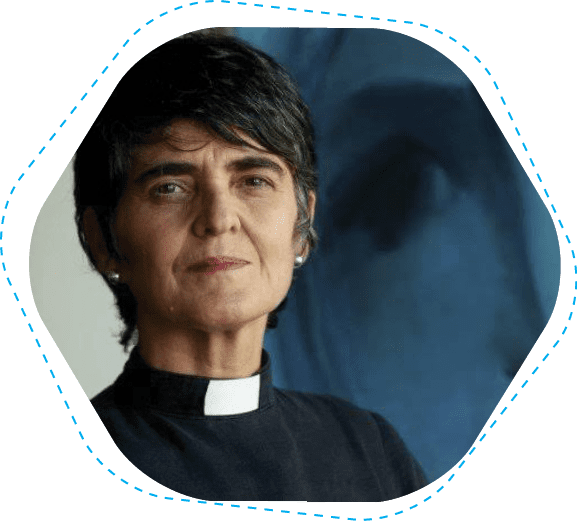
Lusmarina Campos Garcia
Reverend/Researcher, Universidade Federal do Rio de Janeiro
Lusmarina Campos Garcia is a Lutheran theologian and pastor and holds a PhD in Law. Her work focuses on Human Rights, especially women´s rights. Her speech at the Supreme Court of Brazil in 2018 in support to women´s right to abortion caused her intense persecution, including death threats. In order to confront gender injustice in Brazil, her most recent research work focused on the impeachment of President Dilma Rousseff aiming to analyze how political and legal system together fabricated the destitution of the first and only woman President of the country.
Track 1:
Dismantling Patriarchy and Advancing Gender Equality in Religious
and Faith-Based Organizations, Institutions and Structures
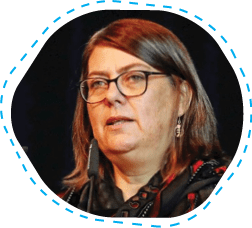 | 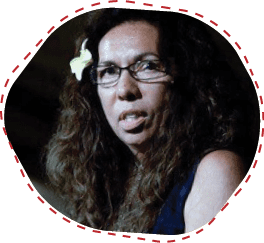 | 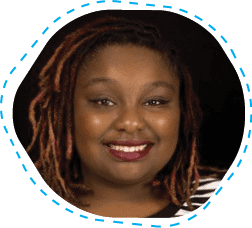 |
Rev. Dr. Elaine Neuenfeldt | Dr. Jenny Te Paa Daniel | Indhira Udofia, MDiv, LCSW |
Track 2:
Dismantling Patriarchy and Advancing Gender Equality
in Women’s Health and Gender Based Violence
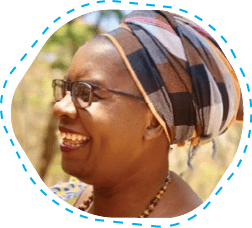 Dr. Nyaradzayi Gumbonzvanda | 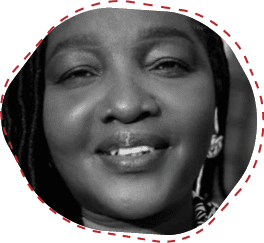 Ashella Tshedza Ndhlovu | 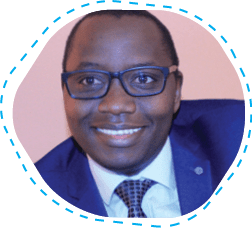 Michael Ngara |
Track 3:
Dismantling Patriarchy and Advancing Gender Equality
in Scriptural Interpretation and Theological Education
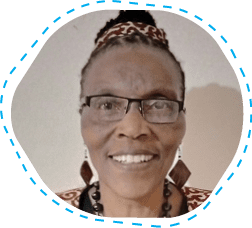 Esther Mombo | 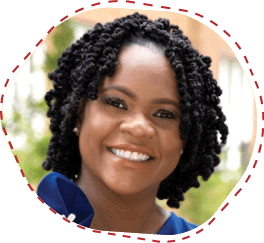 Dr. Yolanda Pierce | 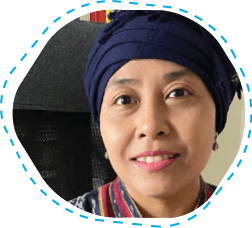 Dwi Rubiyanti Kholifa |
Track 4:
Dismantling Patriarchy and Advancing Gender Equality
in Peace and Reconciliation
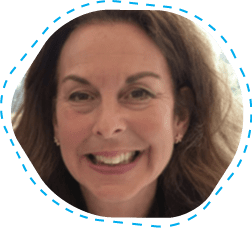 Sarah Snyder | 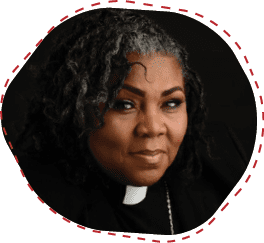 Rev. Traci Blackmon |  Fatima Hallal |
If you’d like to connect and learn more about any of our presenters, please visit our LinkedIn group.
Social media can be revolutionary in its impact when used collectively. When we engage as individuals, we are not powerful enough to overcome the inertia of the platforms.
We can make safer spaces. We can be a proponent of and create redemptive spaces on social media.
Additional Resources
Remain connected by visiting WLC’s LinkedIn group.
LISTEN TO THE ROOM 17 FAITH & GENDER PODCAST
The Rockefeller Foundation and the Bill & Melinda Gates Foundation celebrate the work of these diverse leaders gathering around the issue of gender equality. The views expressed during this convening do not necessarily represent nor are they explicitly endorsed by either foundation.
Emilce Cuda
Secretary, Pontifical Commission of Latin America
Watch Video
“All women are important, not just the ones who can get a good job. We are just a representation of the long fight for social justice. We are part of the creation, we are the love, the dreams. That is beautiful. Together we can build a better world. If we listen to women from different countries, religions and generations, we will hear the voice of God. Maybe women are part of the sign of the times. Maybe God is telling us something through the women.”